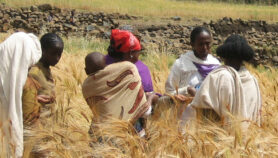Send to a friend
The details you provide on this page will not be used to send unsolicited email, and will not be sold to a 3rd party. See privacy policy.
A series of articles on maternal and child undernutrition in The Lancet has drawn a severe rebuke from Médecins Sans Frontières (MSF).
In a press statement released last week (13 January), the non-profit medical organisation said the series fails to address key areas of treatment, mainly home-based care and ready to use food treatment (RUF), and is actually "undermining efforts to promote urgently needed change".
Milton Tectonidis, nutrition advisor for MSF’s campaign for access to essential medicine says, "Frankly, the series is out of date. It fudges the numbers of deaths by wiping off kwashiorkor [a form of malnutrition] and by using prevalence figures instead of incidence figures to calculate the annual death toll."
"Home-based care with RUF revolutionised the treatment of severe acute malnutrition in young children. As a supplement to breastfeeding and traditional complementary foods, these spreads are highly effective in the first two to three years of life," he adds.
With regard to home-care as opposed to hospital care, Tectonidis says, "It is impossible to expect to treat all these children with therapeutic milks in hospitals. Outpatient treatment encourages earlier presentation and improves programme results."
Zulfiqar Bhutta, professor of paediatrics and child health at Aga Khan University in Pakistan, and one of the authors of the Lancet series, says, "Our estimates represent the most unbiased and up-to-date numbers on severe acute malnutrition using accepted and comparable criteria in various populations."
"We reviewed all available evidence on the use of RUF in both facility and community settings. MSF may have additional unpublished data of which we are unaware, but if they do not make it public then we cannot be expected to refer to it," he adds.
"We hoped MSF would have engaged in a scientific debate through genuine discourse instead of going public with a press release," Bhutta told SciDev.Net.
Esté Vorster, director of the Africa Unit for Transdisciplinary Health Research at NorthWest University in South Africa says she cannot understand why MSF is criticising the Lancet series.
"The Lancet is a respected journal and is placing undernutrition — a largely ignored factor — on the agenda. Although some information is outdated, it doesn’t change the message," she says. "For too long, developing countries have not paid attention to malnutrition. It is now being considered, and that’s what’s important."













